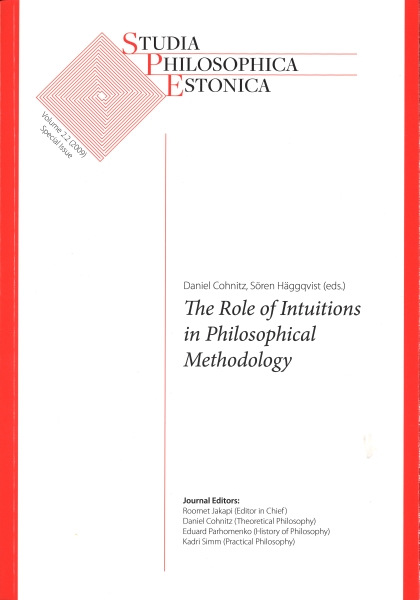Philosophical Intuitions
DOI:
https://doi.org/10.12697/spe.2009.2.2.04Keywords:
metaphilosophy, epistemology, intuitions, philosophical naturalismAbstract
What exactly is a philosophical intuition? And what makes such an intuition reliable, when it is reliable? This paper provides a terminological framework that is able answer to the first question, and then puts the framework to work developing an answer to the second question. More specifically, the paper argues that we can distinguish between two different "evidential roles" which intuitions can occupy: under certain conditions they can provide information about the representational structure of an intuitor's concept, and under different conditions, they can provide information about whether or not a property is instantiated. The paper describes two principles intended to capture the difference between the two sets of conditions---that is, the paper offers a principle that explains when an intuition will be a reliable source of evidence about the representation structure of an intuitor's concept, and another principle that explains when an intuition will be a reliable source of evidence about whether or not a property is instantiated. The paper concludes by briefly arguing that, insofar as philosophers are interested using intuitions to determine whether or not some philosophically interesting property is instantiated by some scenario (for instance, whether knowledge is instantiated in a Gettier-case), the reliability of the intuition in question does not depend on whether or not the intuition is widely shared.
References
Alexander, J. and Weinberg, J. (2007). Analytic epistemology and experimental philosophy, Philosophy Compass 2: 56-80.
Audi, R. (2004). The Good in the Right: A Theory of Intuition and Intrinsic Value, Princeton University Press.
Bealer, G. (1996). A priori knowledge and the scope of philosophy, Philosophical Studies 81: 121-142.
Bealer, G. (1998). Intuition and the autonomy of philosophy, in M. Depaul and W. Ramsey (eds), Rethinking Intuition: The Psychology of Intuition and Its Role In Philosophical Inquiry, Rowman & Littlefield Publishers, Inc, pp. 201-239.
Bealer, G. and Strawson, P. (1992). The incoherence of empiricism, Proceedings of the Aristotelian Society 66 (Supplement): 99-138.
Block, N. and Stalnaker, R. (1999). Conceptual analysis, dualism, and the explanatory gap, The Philosophical Review 108: 1-46.
Fodor, J. (2008). LOT 2: The Language of Thought Revisited, Oxford University Press.
Gettier, E. (1963). Is justified true belief knowledge?, Analysis 23: 121-123.
Goldman, A. (2001). Replies to contributors, Philosophical Topcs 29: 461-508.
Gould, S. (1996). The mismeasure of man, W.W. Norton & Company.
Guyot, K. (1986). Specious individual, Philosophica 31: 101-126.
Häggqvist, S. (1996). Thought Experiments in Philosophy, Stockholm Studies in Philosophy, Almqvist & Wiksell International.
Harman, G. (1977). The Nature of Morality, Oxford University Press.
Harman, G. (2008). Using a linguistic analogy to study morality, in W. Sinnott-Armston (ed.), Moral psychology, Vol. The evolution of Morality, M.I.T. Press, pp. 345-352.
Hogarth, R. (2001). Educating Intuition, University of Chicago Press.
Huemer, M. (2005). Ethical intuitionism, Palgrave MacMillian.
Kitcher, P. (1984). Species., Philosophy of Science 51: 308-333.
Kornblith, H. (2002). Knowledge and its Place in Nature, Oxford University Press.
Kornblith, H. (2006). Appeals to intuition and the ambitions of epistemology, in S. Hetherington (ed.), Epistemology futures, Epistemology futures, pp. 10-25.
Machery, E. (2009). Doing without Concepts, Oxford University Press.
Machery, E., Mallon, R., Nichols, S. and Stich, S. (2004). Semantics, crosscultural style, Cognition 92: B1-B12.
Nadelhoffer, T. and Nahmias, E. (2007). The past and future of experimental philosophy, Philosophical Explorations 10: 123-149.
Putnam, H. (1975). The meaning of “meaning”, Mind, language, and reality, Vol. 2 of Philosophical papers, Cambridge University Press, Cambridge, pp. 215-271.
Sinnott-Armstrong, W. (2008). Framing moral intuitions, in W. Sinnott Armstrong (ed.), Moral psychology, Vol. The cognitive science of morality, M.I.T. Press, pp. 47-76.
Sorensen, R. (1992). Thought Experiments, Oxford University Press.
Sur, A. (1999). Aesthetics, authority, and control in an Indian laboratory : The Raman-Born controversy on lattice dynamics, Isis 90: 25-49.
Thompson, J. (1971). A defence of abortions, Philosophy and Public Affairs 1: 47-66.
Weinberg, J., Stich, S. and Nichols, S. (2001). Normativity and epistemic intuitions, Philosophical Topics 29: 429-460.





